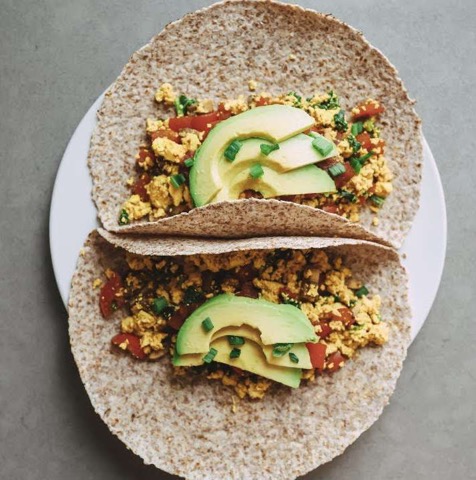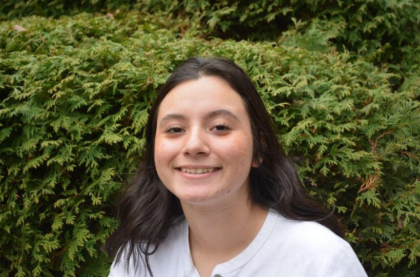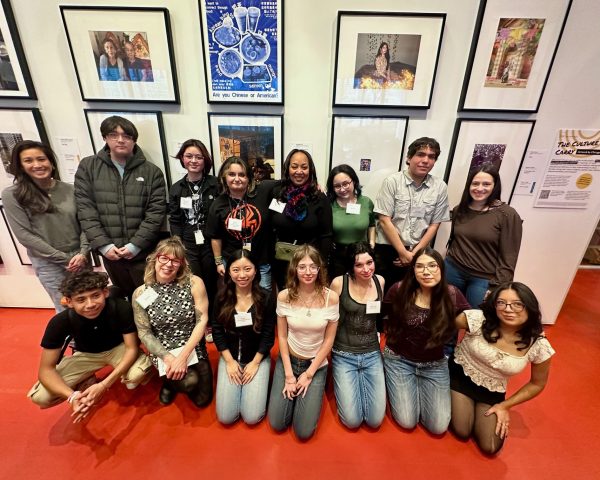Why are people switching to plant-based diets?

Since becoming vegan, Katherine Zurawski has discovered various ways to prepare new food, like tofu, to incorporate protein and nutrients into her diet. (Photo Courtesy of Katherine Zurawski)
After watching videos on animal agriculture in her AP Human Geography class during her freshman year, Katherine Zurawski was left wanting to learn more about the topic. Once delving into research on the industry, Zurawski became aware of the abuse many animals faced while being raised. To stop her contribution to animal agriculture and the mistreatment of the animals, Zurawski decided to change her diet and has been a vegan for 3 years now.
Zurawski, Div. 183, has not been the only one to make this change, though. In a poll conducted by The Vegetarian Resource Group in 2000, 0.9% of the participants from the United States were vegan and 2.5% were vegetarian. However, in Vegetarian Resource Group’s 2020 poll, the percentages increased to 3% of the participants identifying as vegan and 6% as vegetarian.
According to The Vegan Society, veganism is defined as a philosophy that “excludes all forms of exploitation of, and cruelty to, animals for food, clothing or any other purpose.” To avoid exploiting animals, people on vegan diets do not consume any animal products. Like vegans, vegetarians do not eat seafood or any meat but consume other foods and products derived from animals.
Even though Zurawski first became vegan to stop her contribution to animal exploitation, she soon realized that there were other benefits to it.
Zurawski said that she had a few nutrients deficiencies, but since changing her diet, she has learned about lentils and quinoa. Those new sources of protein and nutrients have made her feel more energetic.
“I discovered a lot of new foods and switched to a plant-based diet that gave me a lot of nutrients and minerals,” Zurawski said. “There is oftentimes a misconception that if you go vegan, you will have no protein, but I found new sources of protein and incorporated all of them into my diet.”
In a Rush Stories article from Rush University System for Health, cardiologist Jeffery Soble said that research does show plant-based diets can promote weight loss, reduce the risk of heart diseases, and help manage diabetes. Still, people should not expect to be automatically healthy.
Soble recommends that people begin their transition to veganism and vegetarianism by consulting with their doctor and create a plan on what foods they will use to incorporate necessary nutrients into their diet.
Apart from the potential health benefits, Valery Trigsted, Div. 181, who has been plant-based since seventh grade, said that these diets are also increasing in popularity due to the rise of environmentalism amongst teens and adults.
Zurawski agrees with Trigsted. According to her, people are now educating themselves on the increased emissions of greenhouse gases and deforestation and how the animal agriculture industry plays a crucial role in that increase.
According to a study by the U.N. Food and Agriculture Organization (FAO), 14.5% of all gas emissions came from animal agriculture, of which beef contributed 41%.
There is more evidence that people like Trigsted and Zurawski’s efforts to stop eating meat seem to be making a change, according to the Natural Resources Defense Council’s “Less Beef, Less Carbon” report. The report found that by reducing beef consumption by 19% from 2005 to 2015, Americans reduced carbon emissions equivalent to 39 million fewer cars.
While there are many reasons why people choose to cut meat out of their diet, Trigsted said she sees no particular reason as being more valid than the others.
Despite their possible positive impacts, some people can’t or don’t want to completely transition to plant-based diets.
If people still want to make a difference without changing the way they eat drastically, Trigsted said that people could spread awareness on the treatment of animals by the companies in the meat industry and animal agriculture.
“If people are not willing to go vegetarian, you can guide them to more humane sources of meat and things like that,” Trigsted said.
Additionally, Zurawski said that taking the initiative to learn more about veganism or vegetarianism and making small changes can be significant.
“I know that for a lot of people changing diets really fast will not be easy at all, and I do not want to promote that either. So, you can start doing meatless Mondays and not eat meat for one day, you know, just make a small transition that will make an impact,” Zurawski said. “I think that little changes can make a big difference.”
Your donations directly fund the Lane Tech student journalism program—covering essential costs like website hosting and technology not supported by our school or district. Your generosity empowers our student reporters to investigate, write, and publish impactful stories that matter to our school community.
This website is more than a publishing platform—it's an archive, a research tool, and a source of truth. Every dollar helps us preserve and grow this resource so future students can learn from and build on the work being done today.
Thank you for supporting the next generation of journalists at Lane Tech College Prep!

Stephanie is a senior in her second and final year with The Champion (formerly The Warrior). As a member of Glee Club, she loves to sing and jam out to...



